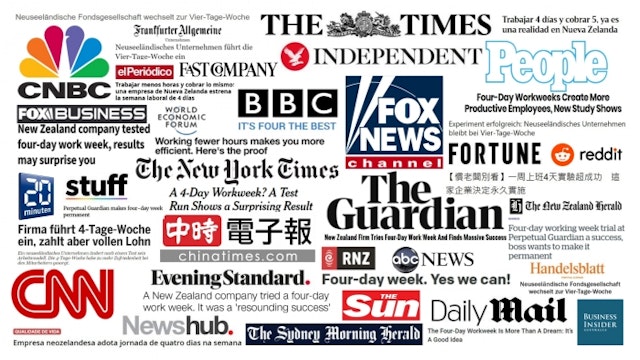Inside Perpetual Guardian's gamechanging campaign to promote the four-day work week
Alexander PR won the ‘Most Effective Use of Earned Media’ category at The Drum PR Awards 2019 with its ‘Four day week’ campaign for Perpetual Guardian. Here, the agency reveals the challenges faced and the strategies used to deliver this successful project.
The challenge
How do you talk to people about death? Why should we focus on productivity instead of hours spent ‘at work’? What do these two questions have in common? Let us explain.
When Alexander PR started working with what is now rebranded Perpetual Guardian, we helped two brands provide New Zealanders with important expertise around estate planning. As Perpetual Guardian emerged as the new brand, Alexander PR was tasked with supporting the internal team to build a reputation for the business.
In early 2018, Perpetual Guardian founder Andrew Barnes raised the bar by announcing that, to help improve employee wellbeing and raise productivity, the company was going to trial a Four-Day Week.

The strategy
The Four-Day Week highlighted the founder’s and leadership’s strong commitment to productivity, staff wellbeing and the belief that enabling employees to be the best they can be at work and at home is good for business.
We maintained an ongoing internal company dialogue, as it was crucial that the trial, and its full implementation, be staff-led with the ability for everyone to feel empowered to communicate their ideas, fears, and criticism openly.
Having a simple productivity-focused, reduced-hour structure helped all participants easily understand the objectives and their role in achieving them. This was also clearly and consistently communicated in all media activity.
We anticipated, because of the unprecedented nature of this Four-Day Week model, that there would be scepticism. We managed this by developing proactive and reactive materials for external use which would explain any aspects of the policy which seemed at any time to be misinterpreted or poorly understood.
The best person to ‘sell’ the vision of the Four-Day Week was the person whose brainchild it was: Andrew Barnes. The long-term partnership between Andrew and APR had developed to the point that when the Four-Day Week was rolled out in media, he had a high degree of trust in our advice and we had a deep understanding of how he and his company were most appropriately presented. We also agreed how to prioritise media activity and respond to the flurry of enquiries that followed each phase of engagement. This was critical to the success of the strategy’s implementation.

The campaign
Phase One of the initiative was characterised by the extensive research done before the trial even started to ascertain that this indeed was an unprecedented type of trial globally. Perpetual Guardian was the only company to offer the 100-80-100 approach to work.
Both agency and client worked together to create comprehensive media collateral; interviews and content generation from those; media reporting and fielding of enquiries – all alongside the internal work.
Staff stress levels went from 45 percent before the trial to 38 percent afterwards; work-life balance rose from 54 percent to 78 percent; and team engagement and empowerment rose from 68 percent to 86 percent. Crucially, productivity levels were maintained over the four days.
Phase Two utilised all the work we had done previously to bring together global announcements of the academic research results; fielding of media reporting and responses; extensive stakeholder engagement and initial work on a dedicated Four-Day Week site.
Phase Three saw the roll-out of the Four-Day Week as permanent opt-in policy; a podcast; a Tedx Talk; the launch of the Four-Day Week website as a hub of all things related to the initiative, including a white paper guide; and ongoing media engagement.
We are now in Phase Four and working together to continue to bring the conversation on the innovation of work to the global audience. A book deal with an internationally-renown publishing house is in place as well.

The results
The game-changing campaign propelled the New Zealand brand to global recognition. What started as internal conversation has ended up being a regular topic in the New York Times, BBC, CNBC, TVNZ, Daily Mail, New Zealand Herald and countless other media across Asia Pacific. The conversation has engaged more than 4.5 billion people across the world in more than 60 countries, and resulted in a TEDx Talk on the subject, plus the founder presenting to the New Zealand and UK Government on the future of work. It has become a global movement, with companies and organisations across the world following suit.
Perpetual Guardian has started this conversation and will add depth to it over the coming years with the formation of a Global Flexible Working Foundation. The company is helping the teams, one staff member at a time, become happier and more productive. Andrew Barnes believes that the world cannot rely on governments alone to create positive change – and that companies can and must be that change.
In New Zealand, at least 18 companies have already implemented the Four-Day Week. Overseas, it has been implemented by at least 39 organisations in eight countries. In total, 440 NZ companies employing 150k+ workers have requested the white paper, out of more than 2,000 global requests. Most of the country’s largest manufacturers, banks, charities, retailers and government ministries have requested it.
This project was a winner at The Drum PR Awards 2019. To register your interest in 2020’s event, click here.

